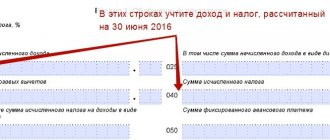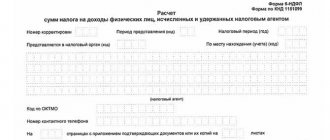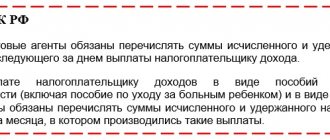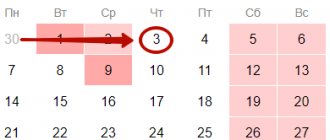Quarterly report
Form 6-NDFL represents quarterly reporting on personal income tax. A special form has been developed and approved for it (Order of the Federal Tax Service dated October 14, 2015 No. ММВ-7-11/450). The same regulatory act also establishes the electronic format of the report and the procedure for filling it out.
All organizations and individual entrepreneurs who are tax agents must submit calculations using Form 6-NDFL (clause 2 of Article 230 of the Tax Code of the Russian Federation). If the company did not have accruals and payments, then it actually does not have the status of a tax agent. This means that there is no need to submit a report on Form 6-NDFL to the tax office.
However, to prevent inspectors from blocking the current account, it is safer to submit a zero calculation or write a letter stating that the company is not a tax agent (clause 3.2 of Article 76 of the Tax Code of the Russian Federation). The letter can be composed in any form.
Date of receipt of actual income for personal income tax purposes
Vitaly Semenikhin,
Head of the Semenikhin Expert Bureau The date of receipt of income is the date on which the income is recognized as actually received for the purpose of including it in the tax base for personal income tax.
We will talk about the features of determining the date of actual receipt of income for the purpose of calculating personal income tax in the material below. The date of receipt of income is determined according to the norms of Art. 223 of the Tax Code of the Russian Federation (hereinafter referred to as the Tax Code of the Russian Federation) and depends on what type of income the taxpayer receives.
In addition, mixed reorganization of a legal entity is also allowed, that is, a simultaneous combination of the forms listed above, for example, reorganization in the form of transformation with simultaneous merger with another organization.
At the same time, reorganization with the participation of two or more legal entities, including those created in different organizational and legal forms, is not prohibited, if the possibility of such a transformation is provided for by the Civil Code of the Russian Federation itself or another law.
The date of actual receipt of income is:
- Pupon receipt of income in cash
— the day of payment of income, including the transfer of income to the taxpayer’s bank accounts or, on his behalf, to the accounts of third parties (clause 1, clause 1, article 223 of the Tax Code of the Russian Federation).The Letter of the Ministry of Finance of Russia dated January 26, 2015 No. 03-04-06/2187 on determining the date of receipt of income in the form of vacation pay for personal income tax purposes states that the date of actual receipt of income in the form of vacation pay is determined in accordance with paragraphs. 1 clause 1 art. 223 of the Tax Code of the Russian Federation as the day of payment of income, including the transfer of income to taxpayer accounts in banks. This conclusion is confirmed by the Resolution of the Presidium of the Supreme Arbitration Court of the Russian Federation dated 02/07/2012 No. 11709/11 in case No. A68-14429/2009;
- when receiving income in kind
— the day of transfer of income in kind (clause 2, clause 1, article 223 of the Tax Code of the Russian Federation).
The Letter of the Ministry of Finance of Russia dated January 15, 2015 No. 03-04-06/306 explains that when receiving income in kind, for example in the form of payment by a bank of insurance premiums for individuals under an agreement concluded between an individual and an insurance organization, the day of transfer of income the date of transfer by the bank of insurance premiums to the insurance company is considered;
- when receiving income in the form of material benefits
— the day of acquisition of goods (work, services), acquisition of securities (clause 3, clause 1, article 223 of the Tax Code of the Russian Federation).Please note that if payment for purchased securities is made after the transfer of ownership of these securities to the taxpayer, the date of actual receipt of income is determined as the day the corresponding payment is made to pay for the cost of the purchased securities;
- when receiving income in the form of material benefits,
obtained from savings on interest when receiving borrowed (credit) funds
, - the last day of each month during the period for which borrowed (credit) funds were provided (clause 7, clause 1, article 223 of the Tax Code of the Russian Federation).The Federal Tax Service of Russia in Letter dated March 29, 2016 No. BS-4-11/ [email protected] “On the taxation of income of individuals” explains that income in the form of material benefits received from savings on interest for the use of borrowed (credit) funds, from 2021 year is determined on the last day of each month in which the loan (credit) agreement was valid, regardless of the date of receipt of such a loan (credit), and also regardless of which day of the month the debt obligation was terminated;
- when receiving income as a result of offset of counter-similar claims
- the day of offset of counter-similar claims (clause 4, clause 1, article 223 of the Tax Code of the Russian Federation); - upon receipt of income as a result of writing off, in accordance with the established procedure, a bad debt from the balance sheet of an organization that is an interdependent party in relation to the taxpayer,
— the day such a debt is written off (clause 5, clause 1, article 223 of the Tax Code of the Russian Federation).
Please note that the provisions of paragraphs. 5 p. 1 art. 223 of the Tax Code of the Russian Federation applies to income received in tax periods starting from 01/01/2017, as indicated by clause 10 of Art. 9 of the Federal Law of November 27, 2017 No. 335-FZ “On amendments to parts one and two of the Tax Code of the Russian Federation and certain legislative acts of the Russian Federation.”
Keep in mind that a special procedure for determining the date of actual receipt of income when writing off a bad debt from an organization’s balance sheet in accordance with the established procedure applies only if the taxpayer and the relevant organization are interdependent persons.
If the write-off in the prescribed manner of a bad debt from the balance sheet of an organization that is not an interdependent party in relation to the taxpayer (including if the impossibility or inexpediency of debt collection is confirmed by the stop of the bailiff on the completion of enforcement proceedings, issued in the prescribed manner), is not associated with a complete or partial termination of the taxpayer’s obligation in accordance with the legislation of the Russian Federation, then the specified date for such a taxpayer is not the date of actual receipt of income for the purpose of taxation on personal income.
Such explanations are contained in letters of the Ministry of Finance of Russia dated May 29, 2018 No. 03-04-06/36301, dated May 4, 2018 No. 03-04-06/30308;
- upon receipt of income arising in connection with reimbursement of travel expenses to the employee,
- the last day of the month in which the advance report is approved after the employee returns from a business trip (clause 6, clause 1, article 223 of the Tax Code of the Russian Federation).
As the Ministry of Finance of Russia explains in Letter No. 03-04-06/6531 dated 02/09/2016, the determination of income subject to taxation, taking into account the provisions of clause 3 of Art. 217 of the Tax Code of the Russian Federation is carried out by the tax agent organization on the last day of the month in which the advance report is approved after the employee returns from a business trip, and the tax amounts are calculated by tax agents in accordance with clause 3 of Art. 226 of the Tax Code of the Russian Federation as of the date of actual receipt of income;
- for income in the form of amounts of profit of a controlled foreign company
- the last date of the tax period for the tax following the calendar year in which the end date of the period for which financial statements for the financial year are prepared in accordance with the personal law of a foreign organization (foreign structure without forming a legal entity) falls.
If, in accordance with the personal law of a controlled foreign company, there is no obligation to prepare and submit financial statements, the date of actual receipt of income in the form of profit amounts of such a company is recognized as the last day of the calendar year following the calendar year for which its profit is determined (clause 1.1 of Art. 223 Tax Code of the Russian Federation);
- when receiving income in the form of wages
- the last day of the month for which the taxpayer was accrued income for work duties performed in accordance with the employment agreement (contract) (paragraph 1, clause 2, article 223 of the Tax Code of the Russian Federation).
Here I would like to draw attention to the Letter of the Ministry of Finance of Russia dated 02/01/2016 No. 03-04-06/4321, which addressed the issue of personal income tax when the bank pays wages to employees on the 20th day of the current month and the 5th day of the month following the billing month. It says that on the last day of the month for which the taxpayer was accrued income in the form of wages, the tax agent calculates the tax amounts.
Before the end of the month, income in the form of wages cannot be considered received by the taxpayer. Accordingly, the tax cannot be calculated until the end of the month.
The tax agent withholds the tax amount calculated at the end of the month from the taxpayer only when it is actually paid after the end of the month for which this tax amount was calculated.
Taking this into account, when paying wages on the 5th day of the month following the billing month, it is necessary to withhold the tax calculated for the previous month and transfer the tax amount to the budget no later than the day following the day the income is paid to the taxpayer.
Since payment of tax at the expense of tax agents in accordance with clause 9 of Art. 226 of the Tax Code of the Russian Federation is not allowed; the transfer of funds to pay personal income tax by a tax agent in advance, i.e. before the date of actual receipt of income by the taxpayer, is not provided for in Chapter 23 “Income Tax on Individuals” of the Tax Code of the Russian Federation. A similar conclusion is contained in the Letter of the Ministry of Finance of Russia dated December 15, 2017 No. 03-04-06/84250;
- when receiving income in the form of wages in the event of termination of the employment relationship before the end of the calendar month
- the last day of work for which the taxpayer was accrued income (paragraph 2 of clause 2 of Article 223 of the Tax Code of the Russian Federation).
As the Ministry of Finance of Russia explains in Letter dated September 24, 2009 No. 03-03-06/1/610, from paragraph. 2 p. 2 art. 223 of the Tax Code of the Russian Federation it follows that the date of receipt by a former employee of an organization of income in the form of an advance payment of wages is recognized as the last working day of his work in the organization.
Income in the form of payments received to promote self-employment of unemployed citizens and stimulate the creation by unemployed citizens who have opened their own businesses of additional jobs for the employment of unemployed citizens at the expense of the budgets of the budgetary system of the Russian Federation in accordance with programs approved by the relevant government authorities are taken into account as part of income for three tax periods with the simultaneous reflection of the corresponding amounts as expenses within the limits of actually incurred expenses of each tax period, provided for by the conditions for receiving the specified amounts of payments (clause 3 of Article 223 of the Tax Code of the Russian Federation).
In case of violation of the conditions for receiving payments, the amounts of payments received are reflected in full as part of the income of the tax period in which the violation was committed.
If at the end of the third tax period the amount of payments received exceeds the amount of expenses, the remaining unaccounted amounts are reflected in full as part of the income of this tax period.
Income (financial support funds) in the form of subsidies received in accordance with Federal Law No. 209-FZ dated July 24, 2007 “On the development of small and medium-sized businesses in the Russian Federation” are reflected as income in proportion to the expenses actually incurred from this source, but no more than two tax periods from the date of receipt.
If, at the end of the second tax period, the amount of financial support received exceeds the amount of recognized expenses actually incurred from this source, the difference between the indicated amounts is reflected in full as part of the income of this tax period.
This procedure for accounting for financial support does not apply to cases of acquisition of depreciable property at the expense of the specified source (clause 4 of Article 223 of the Tax Code of the Russian Federation).
In the case of the acquisition of depreciable property using financial support funds, these financial support funds are reflected in income as expenses for the acquisition of depreciable property are recognized in the manner established by Chapter 25 of the Tax Code of the Russian Federation.
Income (funds of financial support) received by individual entrepreneurs from the budgets of the budgetary Russian Federation under a certificate for attracting labor resources to the constituent entities of the Russian Federation included in the list of constituent entities of the Russian Federation, the attraction of labor resources to which is a priority, in accordance with the Law of the Russian Federation of April 19, 1991 No. 1032-1 “On Employment of the Population in the Russian Federation”, are taken into account as income during three tax periods with the simultaneous reflection of the corresponding amounts as expenses within the limits of actually incurred expenses of each tax period, provided for by the conditions for receiving the specified financial support funds (clause 5 of Art. 223 Tax Code of the Russian Federation).
In case of violation of the conditions for receiving financial support, the amount of financial support received is reflected in full as part of the income of the tax period in which the violation was committed. If at the end of the third tax period the amount of financial support received exceeds the amount of expenses, then the remaining unaccounted amounts are fully reflected in the income of this tax period.
Income in kind
Income of individuals in kind includes (clause 2 of Article 211 of the Tax Code of the Russian Federation):
- remuneration in kind;
- payment for goods or services for an individual in his interests (for example, payment for education or recreation, utilities or food);
- goods received by an individual, work performed in his interests or services provided free of charge or with partial payment.
The payment of income in kind must be reflected in 6 personal income taxes, as well as the payment of monetary remuneration. The income received by an individual and the calculated tax must be taken into account in lines 020 and 040 in the period the income was received. In term 070, you need to record the tax as it is withheld.
In section 2 you need to fill out a separate block for each tax withholding. In this case, the date of receipt of income in kind in 6 personal income tax 2019 must be reflected in line 100. It will be the same in all blocks. The date of payment of income from which tax was withheld must be indicated in line 110. In line 120, indicate the next business day after the date in line 110. In line 130, information about the part of income in kind from which tax was withheld is entered. Line 140 reflects the amount of tax withheld from an individual.
How to calculate personal income tax
Personal income tax on income in kind is calculated on the day of issue. The value of transferred goods (services or property) is taken as the tax base. If part of the cost of the transferred goods is paid by the employee, this amount is not included in the tax base. Or the cost of the goods minus the amount paid is included. Based on the fact that, according to the law, personal income tax must be withheld from an employee on a gift worth more than 4,000 rubles, this amount does not need to be taken into account. But this amount can only be taken into account once a year.
For each employee, the amount of personal income tax must be taken into account personally. But the employee does not always receive income in kind individually. In some cases, this is the income provided for in the collective agreement for all employees of the organization. Examples include paying for a gym for employees or providing them with free meals. In such cases, personal income tax can be calculated as follows: the total amount transferred by the organization to the gym divided by the number of employees visiting it. Some organizations organize the issuance of special cards or coupons that take into account visits to the hall or canteen.
Date of tax withholding on “in kind” income
Since personal income tax on income in kind cannot be withheld upon receipt, the tax agent must withhold tax from any cash income. Those. the date of payment of cash income from which “non-monetary” personal income tax is withheld must be shown on line 110 “Date of tax withholding” of form 6-NDFL. At the same time, the withheld amount of personal income tax should not exceed 50% of the amount of paid cash income (paragraph 2, paragraph 4, article 226 of the Tax Code of the Russian Federation).
Example of personal income tax calculation
In September 2107, the head of Continent LLC, on the basis of an order, gave employee P.P. Petrov a gift. laptop. The organization purchased a laptop for 45,000 rubles in a store. Petrov's salary is 85,000 rubles. This year, Petrov has already received a gift from the organization, the cost of which was 5,000 rubles.
The amount of the gift Petrov previously received exceeds 4,000 rubles, which means we withhold personal income tax from the laptop from the full cost.
Let's calculate personal income tax from a laptop:
45,000 x 13% = 5,850 rubles.
We deduct this amount from Petrov’s salary, which means Petrov’s salary in September will be:
85,000 – (85,000 x 13% + 45,000 x 13%) = 68,100 rubles
And the personal income tax withheld from Petrov and transferred to the budget will be:
85,000 x 13% + 45,000 x 13% = 16,900 rubles
If the tax was not withheld
If the tax agent was unable to withhold tax on income in kind during the calendar year, then in the annual Calculation 6-NDFL he fills out line 080 “Amount of tax not withheld by the tax agent” (clause 5 of Article 226 of the Tax Code of the Russian Federation).
In Section 2 of Form 6-NDFL, income in kind and the tax not withheld from it should be shown as follows (Letter of the Federal Tax Service of Russia dated 01.08.2016 No. BS-4-11/):
- on line 100 – the date of actual receipt of income;
- on lines 110 and 120, the date in the format “00.00.0000”;
- on line 130 – the amount of income received in kind;
- on line 140 – “0”.
Read also
27.07.2016
Answers to common questions
- Question: Will goods purchased from an employer at a reduced cost be considered income in kind?
Answer: If an organization gives a personal discount to an employee, but other employees in a similar situation will not be given a similar discount, then the difference in price will be considered income in kind. And you will need to pay tax on it. If an employee buys a product at a discount price, then his purchase occurs on general terms, that is, he does not receive income. But the organization must have a document that confirms that the purchased goods have been marked down.
- Question : From what payment should personal income tax be withheld from a gift to an employee? From an advance or from salary.
Answer: From the first payment after delivery of the gift, taking into account 50%, and if it is not possible to withhold the entire amount at once, then from the next one.
Accounting for gifts as expenses
If tax authorities treat the very fact of giving gifts by organizations leniently, since the law does not prohibit such donations, then with the possibility of taking into account the cost of gifts in the expenses of the organization, everything is much more complicated.
The fact is that, in accordance with the current rules, expenses for profit tax purposes are recognized as justified (economically justified) and documented expenses incurred to carry out activities aimed at generating income (Article 252 of the Tax Code of the Russian Federation).
At the same time, the Tax Code of the Russian Federation directly establishes a rule according to which, when determining the tax base for corporate income tax, expenses in the form of gratuitously transferred property and expenses associated with such transfer cannot be taken into account (Clause 16, Article 270 of the Tax Code of the Russian Federation).
Since the giving of gifts is precisely a gratuitous transfer of property, from the position of the inspectors, the costs of purchasing these gifts cannot be included in the tax base for corporate income tax (letter of the Ministry of Finance dated September 18, 2017 No. 03-03-06/1/59819). Moreover, this rule is true not only for OSNO, but also for the simplified tax system.
However, an organization can still, at its own peril and risk, classify gift costs as hospitality, advertising and labor costs. In this case, expenses for gifts must be properly confirmed and justified.
For example, an organization for advertising purposes can present branded souvenirs to its clients, potential buyers and partners.
In order to take into account the cost of such products as part of advertising expenses, the organization must have not only primary documents for the purchase of such products, but also a document confirming that these products were used specifically as part of the advertising event (letter of the Federal Tax Service dated 05/08/2014 No. GD-4- 3/8852).
That is, the organization must prove that the donated souvenirs are given to potential buyers and partners for a reason, namely with the aim of increasing the customer base and, as a result, generating income.
As for gifts given to employees, in order to reduce taxable profit, they must be directly related to the production activities of the employees, and even better, be an integral part of wages.
Moreover, such gifts as incentive payments must be specified in local regulations or in the regulations on bonuses (resolution of the Arbitration Court of the Ural District dated December 17, 2014 No. A50-2698/2014).
But in any case, the organization must be prepared for the fact that it will have to defend its case in court, since tax authorities, as a rule, do not consider the costs of gifts to be economically justified expenses.
If an organization wants to avoid possible additional taxes and litigation with tax authorities, then the presentation of gifts should be made at the expense of net profit. That is, after paying tax and without taking into account the cost of gifts as expenses.
An example of filling out 6-NDFL with a gift over 4,000 rubles.
Let's consider line-by-line filling out the 6-NDFL calculation for income in the form of gifts more than 4,000 rubles.
Example
Salaries accrued to 10 company employees:
- for December 2021 (paid in January) - 405,000 rubles;
- for January 2021 (paid in February) - 350,000 rubles,
- for February 2021 (paid in March) - 420,000 rubles,
- for March 2021 (payment in April) - 410,000 rubles.
These employees have a total of 12 children, for whom deductions are provided monthly: 12 * 1,400 = 16,800.
For an anniversary, one of the employees was presented with a gift worth 10,000 rubles, and personal income tax was calculated: (10,000 - 4,000) * 13% = 780 rubles. The gift was presented on February 25, and personal income tax was withheld on March 5 - when paying salaries for February. The tax was transferred to the budget the next day after the withholding, March 6.
Let’s fill out the 6-personal income tax calculation for the 1st quarter of 2021 using these data.
The personal income tax withheld from income in the form of salary for each month was:
- in January0) * 13% = 50,466 rubles.
- in February: (350,000 - 16,800) * 13% = 43,316 rubles.
- in March0) * 13% = 52,416 rubles.
- in April0) * 13% = 51,116 rubles.
Line 020 will include all income accrued for the period from January to March 2021, including the amount of the gift: 350,000 + 420,000 + 10,000 + 410,000 = 1,190,000 rubles. However, the salary for December is not included here, since it was accrued in 2021.
In line 030, reflect deductions - for children and from gifts: (16,800 * 3) + 4,000 = 54,400 rubles.
In line 040, show the total amount of calculated personal income tax: (1,190,000 - 54,400) * 13% = 147,628 rubles.
Indicate the tax withheld in the 1st quarter, including from a gift, in line 070: this will also include personal income tax for December 2021, withheld in January 2021. But the tax for March was withheld in April, so it is calculated for the 1st quarter no need to include: 50,466 + 43,316 + 780 + 52,416 = 146,978 rub.
Lines 040 and 070 may not be equal to each other. They will be the same only if personal income tax was accrued and withheld in the same reporting period.
Section 1 of form 6-NDFL is as follows:







